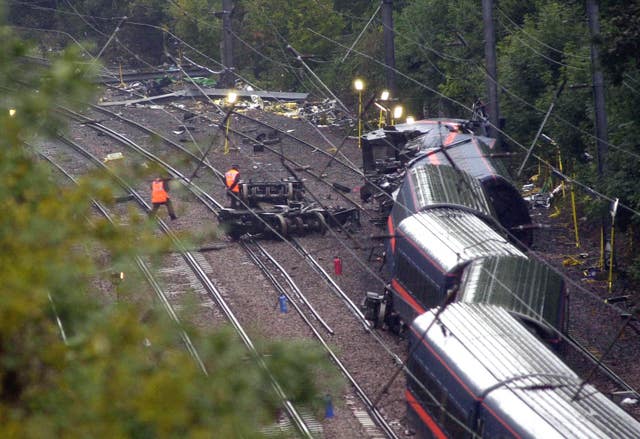Survivors of the Hatfield rail crash will join those bereaved by the tragedy to mark its 20th anniversary.
The four passengers killed when an express train derailed on October 17 2000 will be remembered in a service at St Etheldreda’s Church in the Hertfordshire town.
Capacity at the annual gathering will be limited to 30 people due to Covid-19 restrictions.
Father Darren Collins, who will conduct the service, told the PA news agency: “It was heart-breaking at the time, and the town wants to remember the lives that were lost and the lives that were changed forever.”
The Hatfield crash was among a spate of fatal accidents on Britain’s railways, but the network’s safety record has vastly improved since that period.
Father Collins said the victims’ families are “reassured that something positive came out of one of the saddest occasions of their lives”.
He went on: “Lessons were learned and the railways became safer.
“They all wish that they’d never lost their loved ones. It’s still hard for them.”
The victims were Steve Arthur, 46, from Pease Pottage, West Sussex; Peter Monkhouse, 50, of Leeds; Leslie Gray, 43, of Tuxford, Nottinghamshire; and Robert James Alcorn, 37, of Auckland, New Zealand.
After the service, attendees usually visit a memorial garden overlooking the scene of the accident near Hatfield station to lay flowers and pay their respects as a group.
This year they are encouraged to go to the site individually, to enable social distancing.

Raymond Donnachie, 64, was working on the train when it crashed.
He was in the restaurant carriage, where the four victims died.
This year will be the first time he will not attend the annual remembrance service, due to the pandemic.
On Saturday he will say a prayer and hold a minute’s silence at his home in Leeds.
His main memory of the crash is crawling out of the restaurant carriage and “seeing such a wreck”.
He said: “We had no idea what had happened. The roof was completely ripped off it.
“Originally, myself and the chef thought it was a bomb blast.
“We got the crew out. They were quite shocked and didn’t want to hang about.
“I called back into the carriage where the four trapped people were and stayed there until the emergency services turned up.”
Grant Shapps, Transport Secretary and MP for Welwyn Hatfield, said the crash is “still felt by many today” in his constituency and across the nation.
He added: “Our thoughts remain with those who lost their lives, and those whose lives were forever changed.
“In the two decades since the crash, we have strived to build a better, safer railway. This is the legacy which we owe to the victims of this tragedy.
“We have some of the safest railways in the world, yet the recent Stonehaven crash shows that, whilst rare, we can never stop working hard to improve safety.”
HM Chief Inspector of Railways Ian Prosser said: “Significant improvements to safety have been made since, and partly as a result of, Hatfield, and the railway today is one of the safest in Europe.
“This bears testimony to the great efforts made across the industry over the past decades.”
Manuel Cortes, general secretary of the Transport Salaried Staffs’ Association, claimed the crash – which was caused by a broken rail – was “a constant reminder of the failure of rail privatisation”.
He said: “The takeover of Britain’s rail infrastructure by publicly owned Network Rail took the profit motive out of maintaining and running our tracks, and since then safety standards have dramatically improved. But we must remain vigilant.”




Why are you making commenting on The National only available to subscribers?
We know there are thousands of National readers who want to debate, argue and go back and forth in the comments section of our stories. We’ve got the most informed readers in Scotland, asking each other the big questions about the future of our country.
Unfortunately, though, these important debates are being spoiled by a vocal minority of trolls who aren’t really interested in the issues, try to derail the conversations, register under fake names, and post vile abuse.
So that’s why we’ve decided to make the ability to comment only available to our paying subscribers. That way, all the trolls who post abuse on our website will have to pay if they want to join the debate – and risk a permanent ban from the account that they subscribe with.
The conversation will go back to what it should be about – people who care passionately about the issues, but disagree constructively on what we should do about them. Let’s get that debate started!
Callum Baird, Editor of The National
Comments: Our rules
We want our comments to be a lively and valuable part of our community - a place where readers can debate and engage with the most important local issues. The ability to comment on our stories is a privilege, not a right, however, and that privilege may be withdrawn if it is abused or misused.
Please report any comments that break our rules.
Read the rules here